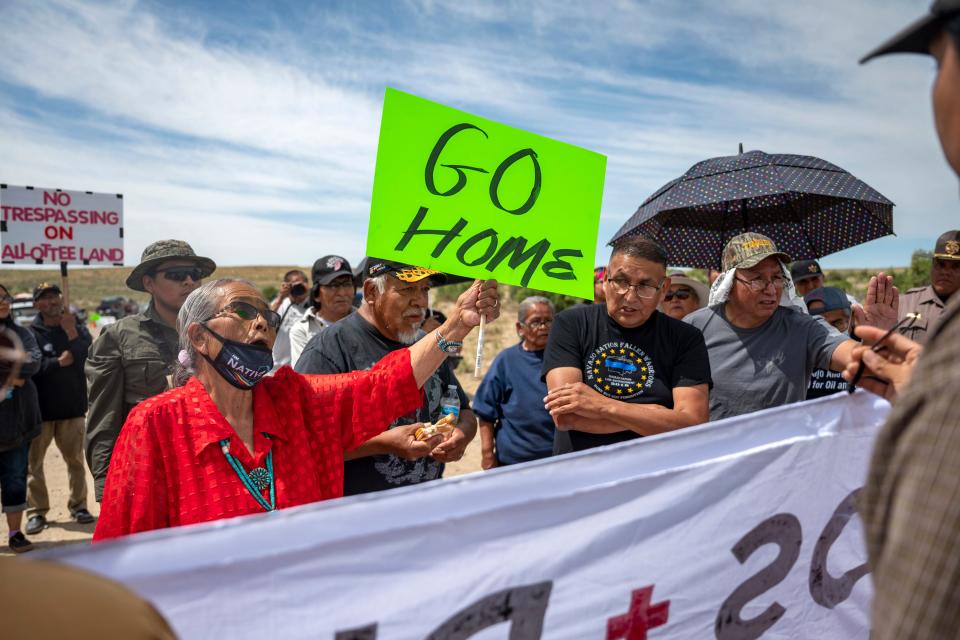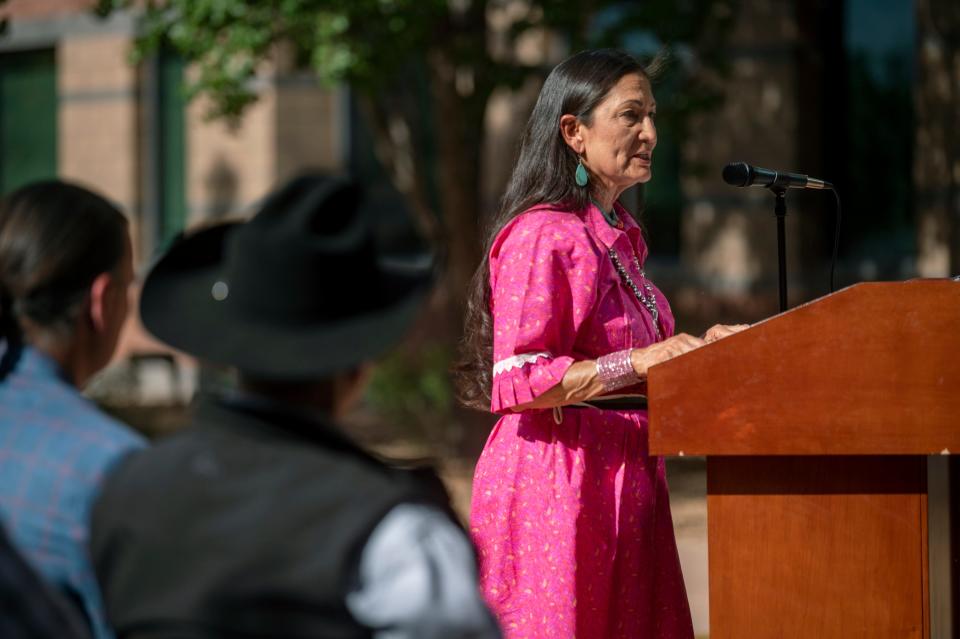Interior Secretary cancels plans at Chaco Canyon after opponents of drilling ban block roads
- Oops!Something went wrong.Please try again later.
Opponents of a plan to halt oil and gas drilling near Chaco Canyon blocked roads leading to the site on Sunday and forced a disappointed Interior Secretary Deb Haaland to cancel a planned event and address the situation in Albuquerque.
Haaland had planned to deliver a speech at the Chaco Canyon National Historical Park celebrating the Biden administration's decision to halt new mineral extraction in a 10-mile buffer around the park. Instead, she spoke briefly in Albuquerque on the history of the Navajo and Pueblo relationship and expressed her disappointment about what had transpired earlier that day outside of Chaco Canyon.
“This morning was not ideal,” Haaland said in her recorded statement. “That’s the nicest thing I can say. To see any road into our national parks, or to our public lands blocked was heartbreaking because our public lands belong to all Americans.”
Earlier this month Haaland announced a withdrawal of more than 336,400 acres of public land, pausing new oil and gas leasing and new mining claims in a 10-mile radius around the park for the next 20 years. It was a welcome move for environmentalists, local grassroots groups against oil and gas drilling, as well as both Pueblo and Navajo tribal members.
But it was also met with backlash from Navajo Nation leadership and Navajo allotment owners, who were angered by the potential loss of income. Allotment owners and other leaders joined to block the road Sunday that led to the site of Haaland's planned speech.
In social media posts, videos showed tense moments between Navajo allotment owners against the buffer zone and Navajo individuals in support of the buffer zone. Signs that read “No Trespassing on Allottee Land,” “Navajo Land,” “Go Home,” “Dept of Interior Haaland Never Met with Navajo Allottees,” “This is God Country,” and anti-Pueblo signs were held up by allottees as they met with anyone trying to get to the park's visitor's center.
“We thought her visit was way too soon,” said Ervin Chavez, Nageezi Chapter President. “We had probably around 100 allottees that gathered at the north entrance of the park to protest. We even talked about putting up a blockage. I realize that some of those Pueblo and people from outside were upset, but enough is enough. Deb Haaland has pushed us to this point.”
For as far back as 2019, tribal, federal and state leaders have discussed a 10-mile buffer zone around Chaco Canyon. Navajo Nation leaders instead suggested cutting the 10-mile buffer zone in half to 5 miles, which allottees also weren’t pleased with. Navajo leaders had passed legislation supporting the switch.
Demonstrations have occurred before between Navajo allottees and then-Navajo Nation President Jonathan Nez, who was in support of a buffer. When Haaland visited Chaco Canyon in 2019, allottees were also in attendance to express their opposition to Haaland and Nez’s stance on a buffer, but nothing occurred as extreme as what happened on Sunday.

A 'peaceful protest' and roadblock
“I was actually the first car met by the blockade created by allottees,” said Janene Yazzie of NDN Collective and a supporter of the buffer. “When we showed up, they seemed unsure on how to do it. They told me to turn around and go home. I told them I’m a Diné and I deserve to be here. They started telling me this isn’t my home and I don't belong there, this is their land, and Pueblos need to stay in their own homes. They were mistaking me as Pueblo. It got really ugly.”
Describing the scene, Yazzie said a lot of the community organizers were at the visitor's center, while she and others were at the front lines of what she said was a hostile situation. Yazzie said they were trying to keep things calm and keep the confusion from escalating because there were Pueblo tribal members, state representatives and other Navajo supporters trying to attend the event.
“The whole time we were down there facing the blockaders, who say they were peaceful, but were saying horrible things, there was only one Navajo police officer there,” said Yazzie. “This whole time at the visitor center, where there was no protest going on, there were nine Navajo cops there and none of them came down until a whole two hours later when we were facing very angry allottees.”
Even though Haaland thanked the Navajo police in her posted statement for their work to keep people safe at the protest, Yazzie said being in the middle of the protest with the lack of police presence led her to believe they weren’t protecting anyone.
At one point, she said allottees were getting violent and spoke loudly in front of an officer about shooting cars and car tires if people didn’t leave. She said she questioned the Navajo police on whether it was their job to help block the road to Chaco Canyon and protect allottees, but officers told her they were neutral and it was a jurisdictional issue.
On social media Sunday, Navajo Nation Police advised visitors heading to Chaco Canyon to postpone visits due to protests.
“I would say it was a peaceful protest and peaceful blockage of the road,” said Chavez. “Overall, it was very successful.”

Navajo president did not attend the protest
President Buu Nygren sent out a statement reiterating his disagreement with Haaland’s recent action to withdraw lands. He said concerns over the land withdrawal were ignored.
“The Department of the Interior continues to disrespect the Navajo Nation by hosting a celebration,” he said. “The financial and economic losses that are impacting many Navajo families as a result of the secretary’s recent land withdrawal are nothing to celebrate.”
Neither the president nor Speaker Crystalyne Curley were present at the protest, which Yazzie said Nygren had called for. In a Fox News article published June 10, Nygren said he asked Navajo Nation Attorney General Ethel Branch to look into all avenues when it comes to legal action against Haaland and the Department of Interior. Nygren said allottees were planning a “peaceful protest,” and that he was planning to protest Haaland’s visit to Chaco Canyon. He said he was getting calls to block her from tribal roads.
“He called for this protest,” said Yazzie. “They really believed he was at another entrance protesting, and so I believed that for a long time and it turned out he was nowhere near the event. He called for this, he ceded that hatred. He ceded that information. Then he didn't show up for his own people that he called out there to take the stand. A real leader should’ve been out there.”
Nygren's communication director Donovan Quintero emailed a statement to The Arizona Republic to clarify that Nygren did not call for the protest, and that, in Nygren's understanding, it was coordinated by Navajo allottees. He also clarified that Nygren did not say he would attend any protest relating to Chaco Canyon.
"Self-determination is the key to exercising Navajo sovereignty," Nygren said in a statement. "It empowers the Nation to continue to move forward, to make decisions that align with Navajo values and beliefs. It is through self-determination that the Navajo people can preserve our culture, our language, and our way of life for generations to come."
The president continues to foster good relationships with key allies at the federal level, such as the Department of the Interior Secretary Deb Haaland, Quintero said, even when tribal sovereignty is undermined by decisions that affect tens of thousands of Navajo allottees in the Eastern Navajo Agency. Nygren has not spoken with Haaland since her announcement, Quintero said.
'It's time we start voting red'
In April, Navajo lawmakers passed legislation at the Naabikiyati committee level rescinding the 5-mile buffer zone that was passed and opposing any buffer zone and land withdrawal. In a statement after Haaland’s announcement of the 10-mile buffer zone, Curley, the Navajo speaker, said previous Navajo leadership attempted to compromise by proposing the 5-mile buffer as opposed to 10 miles, “but our voices were not heard.”
“She (Haaland) is basically laughing at Navajo,” said Chavez about Haaland’s announcement after the legislation passed. “She has no respect. Today, I spoke to the group and said ‘Hey, it’s time we start voting red.’ You have a New Mexico delegation that’s all Democrats and they have turned their back on us and are stabbing us in the back.”
Although the ban is reported to have no effect on current Navajo leases, which many Native people, including Navajos with allotted land in the area, depend upon for income, Chavez claimed that isn't true and that the ramifications will be great for allottees.
The withdrawal of land is reported to affect 53 individual allotments, generating $6.2 million a year in royalties for some 5,462 allottees. Many Navajo families rely on this income to meet their daily needs. It is estimated that 418 unleased allotments are also associated with about 16,615 allottees, and the withdrawal could adversely affect well over 22,000 allottees.
“I realized that Lujan is stuck on this opinion; it does not impact allottees,” said Chavez, speaking of U.S. Sen. Ben Ray Lujan, D-N.M. “But yes, it does. When you start to isolate allotment lands as single islands there’s no oil company out there that will risk sinking in an investment just to get to an allotment land if they can't utilize state land to transport oil out.”
Chavez also believes the oil and gas protection is only an excuse and that history is repeating itself with this buffer zone. He said since Haaland is Laguna Pueblo, some people refer to the issue as the “Deb Haaland Laguna Acoma Land Grab,” and another term is “Haaland Freeze.”
“What we are saying to allottees before you know it we’ll have another Hopi vs. Navajo in eastern Navajo, because with Hopi a lot of people were forced out and put into Newlands (Sanders),” said Chavez. “When we explained, this council is now realizing it and supporting allottees."
Yazzie said claims about Haaland's involvement were misinformation encouraged by Navajo Nation leadership and oil and gas companies, and it’s causing a dangerous divisiveness among Navajo and Pueblo. She said nothing in this moratorium affects allottees' right to develop their land.
“They’re using misinformation and telling allottees that they can do no more new leases because they can't drill horizontally through federal and therefore all leases are going to stop that benefit allottees,” said Yazzie. “And somewhere in there they say it's woven in that this is another land grab and this is going to be taken and given to the Pueblos.”
She said the information has been heard over the past two weeks or more on the radio, which is still a major way of getting information for tribal members. She said poor Navajo Nation leadership is at blame here, and her heart breaks for the misinformation that allottees are getting from leadership.
“The goal and necessary step forward is to build Diné and Pueblo solidarity,” said Yazzie. “As ugly as the hate was that we were faced with underneath it all was fear. Fear that was being planted by misinformation, confusion and poor leadership. They (allottees) don't deserve that. They don't deserve to have their poverty weaponized against them and have their lack of access to information weaponized against them, to use them as pawns for oil and gas interests and tribal leaders that support that.”
The Republic reached out to Curley to ask why she wasn't in attendance, as well as other questions, but she did not respond to inquires.
Arlyssa Becenti covers Indigenous affairs for The Arizona Republic and azcentral. Send ideas and tips to arlyssa.becenti@arizonarepublic.com.
Support local journalism. Subscribe to azcentral.com today.
This article originally appeared on Arizona Republic: Interior Secretary Deb Haaland cancels Chaco event amid protests

